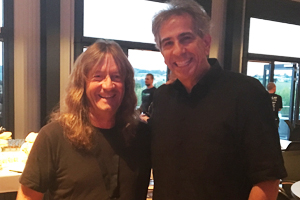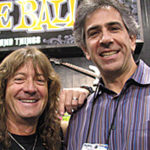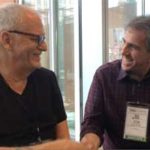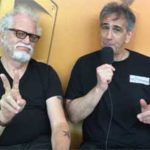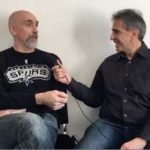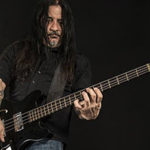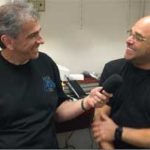Long-time Dixie Dreg talks about gigs, equipment, solo projects and much more!
Exclusive interview with FBPO’s Jon Liebman
December 7, 2009
As a bass player, Dave LaRue is well known for his long association with the Steve Morse Band and the Dixie Dregs. He has also recorded and/or performed with Joe Satriani, John Petrucci, Vinnie Moore, Deep Purple, Bruce Hornsby, Pat Travers, Eric Johnson, Steve Vai, Planet X and many others.
LaRue’s long list of awards and distinctions includes two Grammy nominations, repeated listings in “Best Overall” category in the Bass Player Magazine reader’s poll and a “Lifetime Achievement Award for the Advancement of Bass Guitar” from the Florida Guitar Show. Dave’s book, On the Record, is a collection of transcriptions of some of his most popular bass lines. He has also released an instructional DVD, Essential Bass Concepts. His latest CD, Hub City Kid, features Mike Stern, T Lavitz and Rod Morganstein. In addition to touring and performing, Dave is an adjunct professor at Stetson University in Florida.
FBPO: What kind of musical upbringing did you have? How did you end up a bass player?
DL: I have two sisters and a brother, all of whom were into pop and rock music. My brother played a little guitar, as well. They all enjoyed singing and dancing and they got me into the Beatles early on. As my siblings got into heavier stuff, like Zeppelin and The Who, I followed along and really got into the whole rock music scene. A good friend of mine was a drummer and I loved hanging around when he would play with his band. At some point, the bass player in his band quit and my friend showed me some simple bass lines and suggested I jam with him. I was hooked from that point. I started on the bass, and never looked back.
FBPO: You’ve been with Steve Morse for so long, it’s hard to imagine him without you. What were you doing before you got that gig and how did it come about?
DL: I was living in New Jersey, playing as much as I could in as many bands as possible between Philly and NYC. I worked with a lot of great musicians doing cover bands, original projects, rock bands, jazz gigs and everything in between. I was in a fusion trio called Stretch, with guitarist Glenn Alexander in the mid ’80s and we started to create a bit of a buzz. Around that time I did a record date for a guitarist named John Macey and he had T Lavitz from the Dregs do the keyboard tracks. T and I started working together after that. I played on a couple of T’s records and got a chance to work with Dregs drummer Rod Morgenstein. T recommended me to Steve when the Dregs gig came up. The following year, Steve and I re-started the Steve Morse Band.
FBPO: Any interesting stories from your 20+ years with that band? Maybe a good “road” story?
DL: That’s a tough one, We have covered a lot of miles and been through the stuff that all working road bands go through. One neat thing about working with Steve, his great musicianship aside, is that I have had the opportunity to fly with him in his plane, many times flying in the right (co-pilot) seat. We have seen some amazing scenery, especially out west. Touring like that is something most guys don’t get to do.
FBPO: Would you say that gig was the springboard for your subsequent work with Joe Satriani, John Petrucci, Vinnie Moore, Albert Lee and so many others?
DL: Yeah, getting the Dregs gig got me my first national exposure. That paved the way for all of the gigs you mentioned, and many others, as well.
FBPO: Talk a little about your career as an educator.
DL: Education has always been a big part of my professional life. When I first got out of college, it was teaching and playing wedding gigs that allowed me to pay my rent, while devoting a lot of time to practicing and playing the music I liked. I found that I really enjoyed teaching and that it actually helped my playing, as well.
Soon after I started working with Music Man, they had me out doing clinics. The clinics are a lot of fun and they allow me to reach a lot of students at one time. I continue to teach at Bass Central in Orlando when I am home, and I try to fit in as many clinics as possible when I’m on the road.
I have an instructional DVD out and I hope to do another this year. I do short video lessons for the Bass Central web site and I have a few correspondence students from different countries. I’m sure that soon I will be teaching students from around the globe in real time over the Internet, using something like Skype.
FBPO: What inspired you to develop your book, On the Record and your DVD, Essential Bass Concepts?
DL: Soon after I started with the Dregs, the folks at REH Video approached me about doing my own instructional video, which became Essential Bass Concepts. In preparing for the video, I watched a lot of videos by other musicians and found that, for the most part, there was not a lot of content for the student to work with. I tried to cram a lot of material, covering several topics, for beginners to advanced students, into Essential Bass Concepts. I think we came out with a pretty good product, hopefully worth the money.
As for On The Record, that came about because of requests from fans. Many of the people I talked to about doing a book really wanted me to do transcriptions of entire songs, so they could really sink their teeth into a tune and not just learn some of the licks. I tried to pick a variety of material that would include a lot of different bass techniques and musical styles.
FBPO: How would you describe Hub City Kid? What kind of album is it and how did you come up with that name?
DL: I used to play every Wednesday night with Stretch at the Court Tavern in New Brunswick, NJ. It was amazing! We would play our crazy brand of fusion music and pack that place on a weeknight. The locals referred to New Brunswick as Hub City and the first track on the original recording was named for the Court Tavern crowd, “Hub City Kids.” Being a Hub City Kid myself, I went with that as the title for the record. The album is representative of my musical tastes. It’s diverse, ranging from harmonically rich ballads like “Glass,” to the full-tilt rocker, “Mechanics and Carpentry.” The bass duet, “Juanita,” reflects the influence of Jaco on my playing.
I prefer playing with bands that do a lot of different styles, where there is a lot of musical variety. Glenn Alexander, my partner in Stretch plays and sings great blues and writes with the harmonic complexity of Allan Holdsworth. The band can swing hard when we want to. The Steve Morse Band is a great gig for me because we will rock out one minute, then play an up tempo Bluegrass tune, do an odd meter extravaganza and follow that up with a Baroque style duet. Those bands have, for me, a nice balance between composition/orchestration, and improvisation.
FBPO: Rumor has it that you’re working on a follow-up release. What can you tell me about that?
DL: I recently joined forces with Holographic Records and we are planning a follow up to Hub City Kid, slated for next year. What we are doing first, however, is releasing a re-mastered version of Hub City Kid, which will include two new tracks. Our feeling was that HCK was a limited release and never got any exposure overseas, so we can take care of that, get the ball rolling and set the stage for the new recording.
FBPO: It seems almost every bass player I’ve interviewed lately (Stu Hamm, Bryan Beller, Mike Dimin, Harvie S) went to Berklee. When were you there and how would you describe your experience?
DL: I left Berklee around 1980. It was a great experience and I would never be doing what I am doing now if I had not gone there. Not everyone has a great experience there, but it fit my particular needs very well. My theory knowledge was lacking and the way theory was taught at Berklee allowed me to make up a lot of ground quickly. The experience I got in the ensembles was also invaluable. Most importantly, it was so great to be in the middle of a thousand hungry musicians, always comparing notes and throwing out ideas, constantly being turned on to new or old music.
FBPO: What kind of equipment are you using these days?
DL: I play Music Man basses, mainly the Bongo, but I use most of their models from time to time, especially in the studio. One of the new tracks for Hub City Kid, “Bombast,” is about 30 tracks of different Music Man basses! I play 4-, 5- and 6-string Bongos, 4- and 5-string Sterlings, a 5-string 25th Anniversary model, a Sting Ray 5 – all of their basses, pretty much. All with Ernie Ball strings, of course.
Live, I use the Ampeg SVT 4 Pro amp, with either 2 SVT 8×10 cabs, or four 4×10’s, depending on the gig. I do use a lot of effects – on the last SMB tour I ran through the TC Electronic G System. It’s a great sounding all-in-one unit. Some of the new Lexicon gear sounds great, too, I hope to get that into my rack for the next leg of the tour in January.
FBPO: You’ve already accomplished so much in your career, including the receipt of a Lifetime Achievement Award, an honor generally bestowed on people much older than you – especially given whatever your age was in 1996! What lies ahead for Dave LaRue? What would you like to do that you haven’t already accomplished?
DL: There is a lot going on this year, with the release of the Steve Morse Band CD, Out Standing In Their Field, and the re-release of Hub City Kid. Next year, I hope to get out a new solo CD, plus we have begun work on a new Stretch record. Beyond that, I really hope to continue to improve as a bass player, a musician, and especially as a composer. I want to continue touring and playing great music with great musicians. I have been very blessed in that regard. I have a lot of ideas for music I want to record, and that is becoming much easier with all of the new recording technology.
FBPO: What do you like to do that doesn’t necessarily involve music?
DL: I love to read and I enjoy watching football, but my main hobby is tennis. It’s great exercise and a great way to clear one’s mind. Like music, the pursuit of perfection is a life-long endeavor. My dream is to hit with Andre Agassi.
